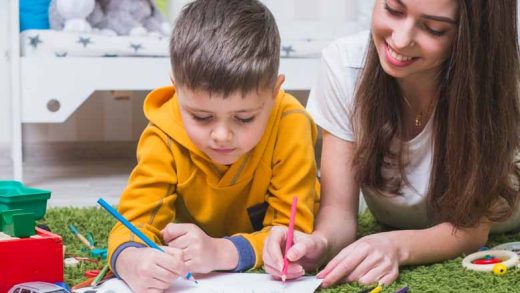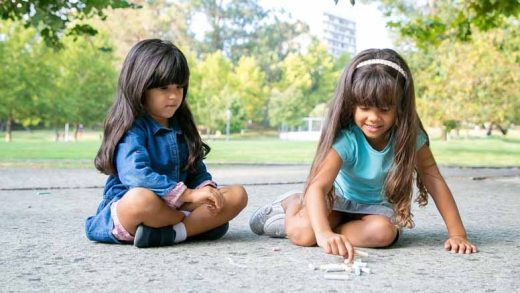Raising a kid is no small feat and requires a lot of patience and understanding. It requires you to train them for their future life as adults. An important part of raising kids is making them adept at quickly making correct decisions. Consider yourself; you must make a lot of decisions in your day-to-day life. This could be anything ranging from taking the shortest route to your office by avoiding traffic, deciding what to cook, especially when you are in a time crunch, or having a difficult conversation with your partner. You can skillfully navigate all of these because you already learned the art of problem-solving. Well, now it’s time for your kids to learn it, too.
What is Problem Solving for Children?
Problem-solving is the ability to handle a difficult situation with calmness and patience and reach a solution that benefits all parties. It is a great virtue that must be cultivated in all young minds.
Consider the situation where your child and his/her friend are playing with a toy car, and all of a sudden, one of them pushes the other and snatches the toy. This is a conflict situation that arose clearly because the toy was unequally shared between both. However, it could have been avoided if the kids had problem-solving abilities. Instead of pushing, the kid could have requested to play with the toy next, patiently wait for his turn, or ask for help from an elder.
Why is It Important to Teach the Problem-solving Approach to Kids
Between 3 and 5, a child experiences tremendous cognitive, social, emotional, language, sensory, and motor development. Such abrupt changes often leave them confused, overwhelmed, and intimidated. The world around them can often seem unfair, and when a child does not get what he/she wants, he/she throws some serious tantrums. In these cases, teaching children problem-solving skills can help them act rationally and with patience. If your child acquires this ability, he/she will clearly communicate the problem and think out a creative solution apart from reacting logically.
How to Teach Problem-solving Skills to Children
There is no hard and fast formula for teaching problem-solving ability to kids. It can be tricky, and the strategy changes for every kid. This is because different kids interact in different ways with his/her surroundings. However, when you go to teach them this important skill, make sure that you identify the problem, think out the prior solution before asking them to innovate a probable solution, then guide them while they apply the solution and finally evaluate how good the outcome is.
10 activities that can develop problem-solving skills among preschoolers:
- Give them simple real-life problems: Problem-solving skills are an ability that has to be used continuously. The best way to learn it is by giving your kid simple real-life problems. This could be anything from arranging a few light items in the pantry to arranging their toys at the right designated spot in the house.
- At times ask them to find some possible solutions to a problem you faced: Suppose your kiddo is solving his/her mommy or daddy’s problem. This is no small feat. But think for a moment; your kid will eventually grow up to be an adult who has to solve his/her own This training will not only help him/her think critically but also give them enough confidence to trust their ideas.
- Give them math problems: In mathematics, you have to follow a set of rules and reach one specific solution. This is good training for finding a logical solution while following rules and not getting carried away by emotions.
- Help your kid look for alternative solutions: Open-ended questions work well in this. Whenever your child loses something, instead of searching the entire house, ask questions related to when they last saw the item or what they will do if they don’t find it.
- Puzzles and board games: Puzzles and board games are fun ways to stimulate critical thinking in a young mind. They are continuously presented with a challenge that they need to overcome if they are to win the game.
- Books and stories: Read your kid some books that tell the tales of how the heroes overcame a difficult situation. This will help them associate with situations outside their own and help them think critically about the problems.
- Teach them to handle strong emotional responses: Acting out with emotion to a particular problem is quite natural but it never takes you towards the solution. Teach your child to acknowledge his/her feelings without guilt or shame and react appropriately with the right phrases.
- Behave well around your kids: Make sure that you never lose your cool when you are around your kids. When it comes to children they model the behaviour of their adults and try to imitate them. Even though it might be difficult to always keep your calm , take a moment and think about your toddler. What would he/she learn from it?
- Break down problems: Instead of approaching a problem as a whole, teach your child to separate problems into chunks and deal with each of them individually.
- Teach them to ask questions: Encourage inquisitiveness in your If they learn to ask questions, it will be easy to teach them how to find solutions.
Problem-solving for kids is a great life hack and must be taught to all budding minds to prepare them for the upcoming life. Parents must ensure that their children develop critical thinking skills and act logically when faced with problems. Teachers at the pre-schools also play a critical role in this. So, if you are looking for a school that promotes holistic development in students, you need to consider Kangaroo Kids International Preschool. We employ the best teaching force to help your child think logically when presented with tricky situations. To learn more about our curriculum, contact us today.









